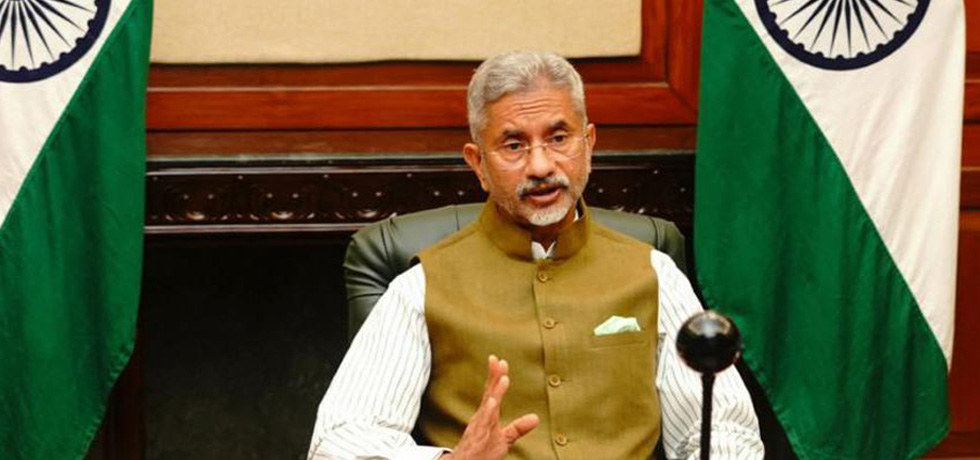India today formally proposed a giant transport corridor that will be formed by uniting the Chabahar route with the older International North South Transport Corridor (INSTC), which will start from Mumbai, with nodes in West Asia, Central Asia, Caucasia and Russia covering large swathes of territory in Eurasia. The corridor will exclude both China and Pakistan.
Speaking in Tashkent, External Affairs Minister S. Jaishankar at a regional connectivity conference stressed the need for robust transport networks within and between Central and South Asia, which
are rooted in history. The EAM said that India's focus in the last few years has been to rebuild links that were diminished by the colonial period. It includes taking "practical steps" to operationalize the Chabahar port in Iran since 2016 which provides "a secure, viable and unhindered access" to the sea for Central Asian countries.
"Its efficacy is now clearly proven," said Jaishankar, quite obviously pointing towards how the port has not only emerged as a commercial transit hub for the region but also facilitated the delivery of humanitarian assistance, especially during the Covid-19 pandemic.
"We have progressed in the Indian Sub-continent and eastwards to the Indo-Pacific. Our horizons extend from Vladivostok to the Gulf and East-Africa. However, the challenges towards Central-Asia and Eurasia remain to be addressed," he added.
As of now, Integration of the International North South Transport Corridor (INSTC) and the Chabahar route has been India's prime focus. In March, India and Iran celebrated 'Chabahar Day', where Jaishankar proposed the integration of the Chabahar Port with the INSTC.
"I am hopeful that during the INSTC Coordination Council meeting, member-states would agree to the expansion of the INSTC route to include the Chabahar Port and also agree on expanding the membership of this project," Jaishankar had said.
The INSTC project came into being in 2002, when the transport ministers of Russia, Iran, and India signed an agreement to establish a 7200-kilometre multimodal ship, rail and road-based transport network. Starting from Mumbai, it would head to Moscow via Iran and the Caspian Sea.
Currently, the INSTC is set to spread its radials on a much bigger area. Essentially the new INSTC is a combination of two corridors. One starts as originally conceived, from Mumbai and heads to Bandar Abbas, a famous Iranian port in the Gulf. From here it takes the overland route to Bandar Anzali, which is on the Caspian Sea coast. Containers are off-loaded here and shipped through the Caspian to its Russian shore at Astrakhan, which becomes the base of further transportation in Eurasia. Over time other countries have been networked in this rapidly mutating corridor including Azerbaijan and Armenia.
The second corridor or the Chabahar route begins at Mumbai, but Gujarat's Mundra port is more prominently in play. From here it heads to Chabahar, Iran's only Indian Ocean port, which has vast potential. From Chabahar, in which India is pitching major investment, the route heads towards Afghanistan via Iran’s Sistan Baluchistan province along a recently India-built road. Over time, a railway is also envisaged, which will link Chabahar with the Hajigak iron ore mines in Afghanistan, where India has made a major investment
As India assured that it stands ready to cooperate, plan, invest and build in pursuit of a more prosperous and inter-connected Eurasia, several countries in the region, including conference host Uzbekistan and Afghanistan, have already shown interest in joining the multilateral corridor project INSTC. New Delhi insists that establishing an eastern corridor through Afghanistan would maximize the potential of Chabahar port and has proposed its inclusion in the INSTC route.
Planners of the INSTC now want to link the two routes into a huge undertaking that will allow landlocked regions of Eurasia, not only to access the rapidly congesting Bandar Abbas, but also the rapidly expanding Chabahar route.
Yet, in veiled references to Pakistan and China, Jaishnkar pointed to geopolitical impediments including myopia of vision that obstruct connectivity projects. EAM pointed out that "politics, vested
interests and instability" can be formidable impediments to ensure regional cooperation, prosperity and economic growth "which is universally driven by 3Cs: connectivity, commerce and contacts''.
In a strongly-worded statement, and with the Pakistan Prime Minister Imran Khan and his foreign minister Shah Mehmood Qureshi in audience at a high-level international conference on connectivity, Jaishankar said that India has learnt lessons from its experiences which need to be understood.
"The real issues are of mindsets, not of disputes. Blocking connectivity in practice while professing support in principle benefits no one. A one-sided view of trade rights and obligations can never work. No serious connectivity can ever be a one-way street," he said during his address at the 'Central and South Asia: Regional Connectivity. Challenges and Opportunities' conference in Uzbekistan today.
Initiated by Shavkat Mirziyoyev, the President of Uzbekistan, the meet was held with an aim to "strengthen the historically close and friendly ties, trust and good-neighbourliness between Central and South Asia" in the interests of all people and countries of both regions.
As Beijing's flagship Belt and Road Initiative (BRI) spreads its wings in the region and beyond, Jaishankar pointed out that building connectivity is an act of trust and respecting sovereignty and territorial integrity are the most basic principles of international relations.
"Connectivity efforts must be based on economic viability and financial responsibility. They should promote economic activity and not create debt burdens," he stressed, in an obvious reference to China which has been accused of pushing developing countries into debt traps in the name of infra development.
With India using Chabahar port to ship humanitarian food assistance to Afghanistan, Jaishankar said that development and prosperity go hand-in-hand with peace and security.
"For reliable connectivity within and through Afghanistan, the world must have confidence in its governance," he asserted in an effort to promote a new pan-Eurasian route that excludes Pakistan and China but provides the vast landlocked parts of Eurasia access to the warm waters of the Indian Ocean.
Also Read: India set to showcase support of giant transport corridors in Central Asia that exclude China
Also Read: International North South Transport Corridor in focus during Jaishankar-Lavrov meet
Read More: Race for warm waters gathers pace in landlocked Uzbekistan




















